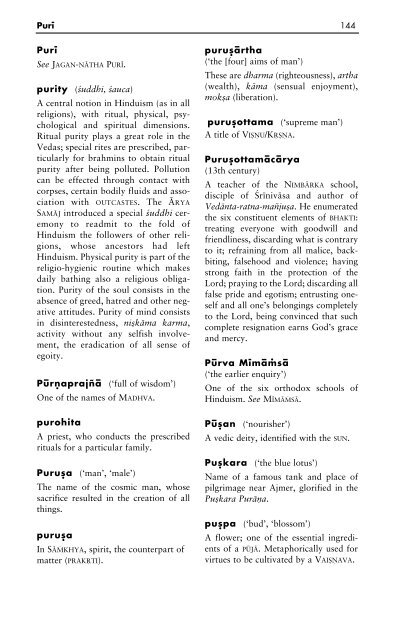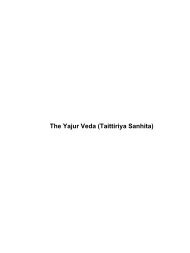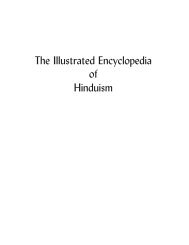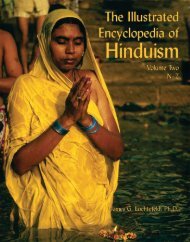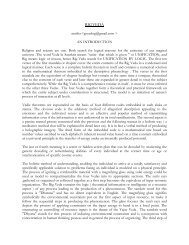A Concise Encyclopedia of Hinduism Klaus K Klostermaie
You also want an ePaper? Increase the reach of your titles
YUMPU automatically turns print PDFs into web optimized ePapers that Google loves.
Purï 144<br />
Purï<br />
See JAGAN-NÄTHA PURÏ.<br />
purity (ÿuddhi, ÿauca)<br />
A central notion in <strong>Hinduism</strong> (as in all<br />
religions), with ritual, physical, psychological<br />
and spiritual dimensions.<br />
Ritual purity plays a great role in the<br />
Vedas; special rites are prescribed, particularly<br />
for brahmins to obtain ritual<br />
purity after being polluted. Pollution<br />
can be effected through contact with<br />
corpses, certain bodily fluids and association<br />
with OUTCASTES. The ÄRYA<br />
SAMÄJ introduced a special ÿuddhi ceremony<br />
to readmit to the fold <strong>of</strong><br />
<strong>Hinduism</strong> the followers <strong>of</strong> other religions,<br />
whose ancestors had left<br />
<strong>Hinduism</strong>. Physical purity is part <strong>of</strong> the<br />
religio-hygienic routine which makes<br />
daily bathing also a religious obligation.<br />
Purity <strong>of</strong> the soul consists in the<br />
absence <strong>of</strong> greed, hatred and other negative<br />
attitudes. Purity <strong>of</strong> mind consists<br />
in disinterestedness, ni•käma karma,<br />
activity without any selfish involvement,<br />
the eradication <strong>of</strong> all sense <strong>of</strong><br />
egoity.<br />
Püræaprajñä<br />
(‘full <strong>of</strong> wisdom’)<br />
One <strong>of</strong> the names <strong>of</strong> MADHVA.<br />
purohita<br />
A priest, who conducts the prescribed<br />
rituals for a particular family.<br />
Puru•a (‘man’, ‘male’)<br />
The name <strong>of</strong> the cosmic man, whose<br />
sacrifice resulted in the creation <strong>of</strong> all<br />
things.<br />
puru•a<br />
In SÄßKHYA, spirit, the counterpart <strong>of</strong><br />
matter (PRAKØTI).<br />
puru•ärtha<br />
(‘the [four] aims <strong>of</strong> man’)<br />
These are dharma (righteousness), artha<br />
(wealth), käma (sensual enjoyment),<br />
mok•a (liberation).<br />
puru•ottama (‘supreme man’)<br />
A title <strong>of</strong> VIÆŒU/KØÆŒA.<br />
Puru•ottamäcärya<br />
(13th century)<br />
A teacher <strong>of</strong> the NIMBÄRKA school,<br />
disciple <strong>of</strong> Ÿrïniväsa and author <strong>of</strong><br />
Vedänta-ratna-mañju•a. He enumerated<br />
the six constituent elements <strong>of</strong> BHAKTI:<br />
treating everyone with goodwill and<br />
friendliness, discarding what is contrary<br />
to it; refraining from all malice, backbiting,<br />
falsehood and violence; having<br />
strong faith in the protection <strong>of</strong> the<br />
Lord; praying to the Lord; discarding all<br />
false pride and egotism; entrusting oneself<br />
and all one’s belongings completely<br />
to the Lord, being convinced that such<br />
complete resignation earns God’s grace<br />
and mercy.<br />
Pürva Mïmäƒsä<br />
(‘the earlier enquiry’)<br />
One <strong>of</strong> the six orthodox schools <strong>of</strong><br />
<strong>Hinduism</strong>. See MÏMÄßSÄ.<br />
Pü•an (‘nourisher’)<br />
A vedic deity, identified with the SUN.<br />
Pu•kara (‘the blue lotus’)<br />
Name <strong>of</strong> a famous tank and place <strong>of</strong><br />
pilgrimage near Ajmer, glorified in the<br />
Pu•kara Puräæa.<br />
pu•pa (‘bud’, ‘blossom’)<br />
A flower; one <strong>of</strong> the essential ingredients<br />
<strong>of</strong> a PÜJÄ. Metaphorically used for<br />
virtues to be cultivated by a VAIÆŒAVA.


